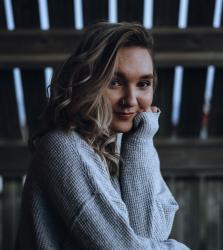Our contemporary idea of the word ‘Apocalypse’ describes an inescapable end; for example, for many, COVID-19 brought an end to humanity as we understood it—a societal apocalypse. However, such a designation is narrow in its perspective and Apausalypse, the new documentary by directors Andri Snær Magnason and Anni Ólafsdóttir reveals the true origins of this word, as it explores the great pause that enveloped the world due to the COVID-19 pandemic.
This unfolding of society over 2020 led Andri Snær and Anni to the name for the film. Visual artist Haraldur Jónsson, who is featured in the film, told the two that the Greek word ‘Apocalypse’ originally meant to uncover something. So contrary to last year symbolizing an ending—a modern apocalypse—the film instead suggests that it could signify the unveiling of a world that had long been buried by the strains of humankind. As society struggled to find its footing, earth was able to find its breath again.

Anni Ólafsdóttir and Andri Snær basking in the sun
Capturing the Apausalypse
While all opportunities seemed to have faded amid the global lockdown from COVID-19, Andri Snær and Anni allowed art to persevere. They hoped to capture this moment in time through the nation’s best storytellers, such as photographer Ragnar Axelsson, poet Elísabet Jökulsdóttir, and professor of philosophy Sigríður Þorgeirsdóttir, gaining a philosophical and theoretical deep-dive before any of these creative thinkers had time to process the unfolding of the world around them.
“Our intentions were to make a work of art when almost everything was impossible,” Andri Snær asserted, speaking to the limitations they faced; when asked about the status of restrictions, Anni explained that “Everything was closed” but nonetheless, the pair traveled around Iceland. They engaged in conversations from a distance—through living room windows or metres away in cars. The two set out with no idea where the conversations would lead them—they talked indiscriminately with subjects, developing the narrative of the Apausealypse as they went. When asked about how they chose which individuals to interview, Andri Snær admitted “We didn’t know if they would be the ones” but that regardless of what came of the words exchanged, they would maintain historical significance.
Occasionally overlooked victims of the pandemic include kids—withdrawn from social situations and experiences that shape their character. In one scene of the film, a couple’s eight year old son had not been in school for several weeks, and it did not take long for him to express the suppressed emotions of confusion and isolation felt by children across the world. The boy took a seat at the bench of the piano, stabbing at the keys as he sang with rage against the virus.
The return, release and reflect
In the film’s closing, images of an empty airport and a car-less Reykjavík flash across the screen. Hints of desolation and sorrow pervade, carried by the gentle notes of musician Ásta Fanney Sigurðardóttir, while a poem is read aloud describing the resurgence of nature that was seen around the world. With the suspension of societal consequences, it explains, came notions of peace and tranquility unfounded in a century of haste. While the film does not explicitly highlight the revival of nature, Andri Snær explains that “It is about global warming but in more subtle ways.” Wishfully, he asks “If we can stop for a virus and protect the elderly, can we protect the future?”
The global community has been trapped in a perpetual cycle of healing, yearning for a day of relief and release. “Immediately, we will not learn anything but, in the long run, we will look at this as a really significant milestone in how we understand the economy, ecology, [and] society,” Andri Snær adds. And thus, a piece such as Apausalypse serves as a sobering reminder of the places that we have been and the places we are to go if we cannot fully reflect on the pause that allowed the earth to experience a degree of recovery. As Anni concludes, “We so easily forget.”
Apausalypse is showing at Bíó Paradís starting June 4th with English subtitles and at international film festivals.
Note: Due to the effect the Coronavirus is having on tourism in Iceland, it’s become increasingly difficult for the Grapevine to survive. If you enjoy our content and want to help the Grapevine’s journalists do things like eat and pay rent, please consider joining our High Five Club.
You can also check out our shop, loaded with books, apparel and other cool merch, that you can buy and have delivered right to your door.
Also you can get regular news from Iceland—including the latest notifications on eruptions, as soon as they happen—by signing up to our newsletter.
Buy subscriptions, t-shirts and more from our shop right here!





















